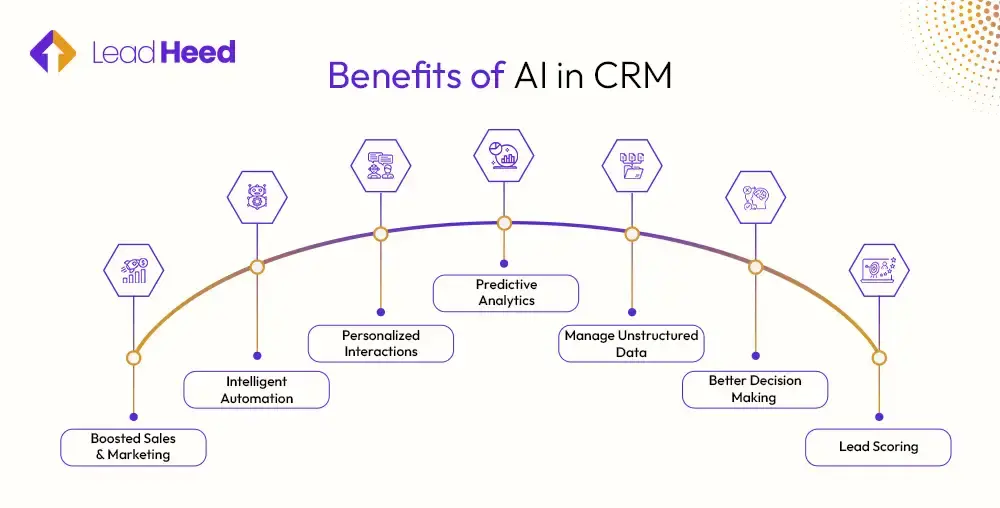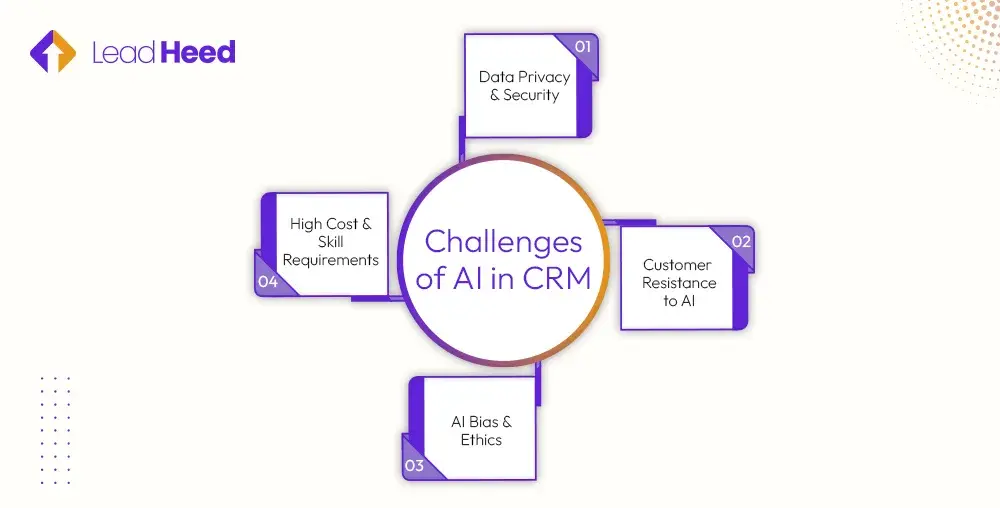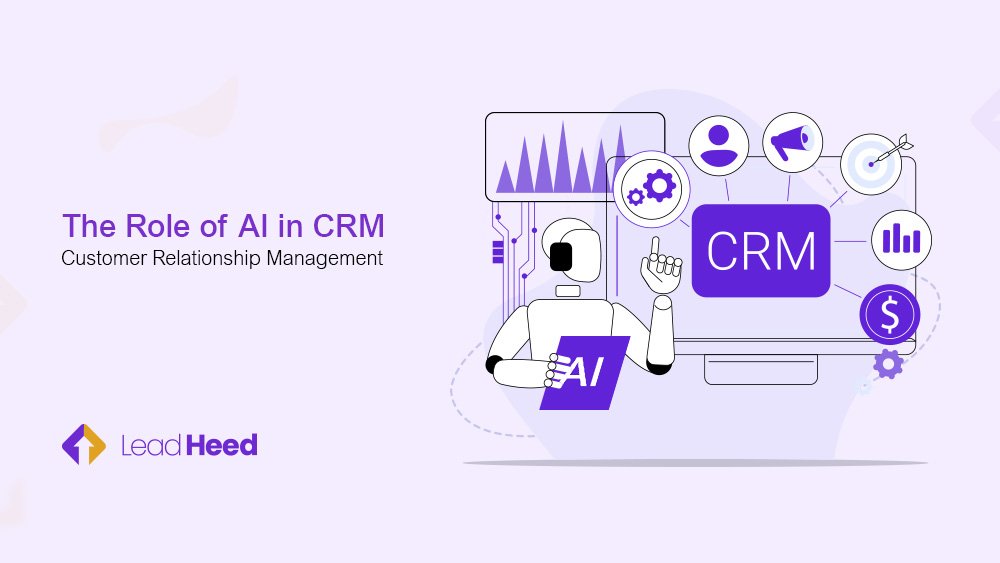An ordinary CRM cannot effectively perform in today’s rapidly changing technological environment. A traditional CRM struggles to adapt to these changes, leading to customer dissatisfaction and potential loss of your business. This hinders growth and slows down business processes.
Integrating AI in CRM (Customer Relationship Management) plays a vital role in dealing with the above complexities and fostering business growth. It provides you with a deeper understanding of customer behavior and preferences, helping to predict upcoming market trends. This helps to identify the opportunities to increase the productivity and efficiency of the business.
In this blog, you’ll discover how the role of AI in CRM can transform your business and drive better outcomes.
How AI Enhances CRM Functionality?
AI (Artificial Intelligence) enhances CRM functionality by helping your business understand customers better and serve their needs. Predictive analytics identifies customer patterns and predicts their behavior. This allows companies to offer more personalized experiences.
With AI integrated into CRM, it provides valuable insights, enabling you to make smarter and effective decisions. Additionally, it streamlines operations by automating repetitive tasks like follow-ups, emails, managing customer engagement, etc. This means it saves your team’s time, enabling them to focus on more strategic tasks.
Benefits of AI in Customer Relationship Management
An AI-integrated CRM helps your business boost its overall efficiency and productivity by leveraging predictive analytics, data insights, personalized customer interaction, intelligent automation, and marketing performance.

Here’s a more detailed look at the benefits:
1. Predictive Analytics & Data Insights
An AI-integrated CRM system analyzes historical data to identify customer behavior and preferences. By studying past interactions and behaviors, the system can predict your customers’ needs in the near future.
These factors provide data insights that assist in forecasting sales, identifying market trends, and optimizing the target audience. This ensures that the proper recommendations are delivered to the right audience at the optimal time. It addresses customer concerns and enhances engagement, resulting in customer satisfaction and improved productivity.
2. Personalized Customer Interaction
AI captures the interest of customers by personalizing customer interactions. After analyzing customer data along with their past interactions, it uses algorithms to recommend products that fit customers’ needs.
As a result, it builds stronger customer relationships, improves customer satisfaction, and ultimately boosts sales. Also, it helps with customer retention.
3. Manage Unstructured Data
A CRM system manages large amounts of data coming from different communication channels like social media, emails, and chats. Most of these data are unstructured, which makes them challenging to analyze.
AI uses algorithms like Natural Language Processing (NLP) and Machine Learning (ML) to convert unstructured data into structured data. This structured data allows your business to identify high-value potential customers and set priorities.
4. Intelligent Automation
Integrating AI into your CRM system automates repetitive tasks such as follow-ups, lead management, workflows, customer support, and more. AI tools like chatbots and virtual assistants provide quick responses to customer inquiries.
Automating routine tasks reduces the workload of teams. This allows them to focus on what truly matters and make strategic decisions. Also, it ensures accuracy and consistency by reducing human errors, resulting in a better user experience.
5. Better decision-making with real-time data insights
AI applications such as predictive analytics help make more informed decisions by analyzing real-time data insights. This allows your business to identify patterns and trends that humans might overlook. Furthermore, it optimizes marketing campaigns, pricing, channel management, product design, etc.
6. Enhanced sales and marketing performance
AI in the CRM system enhances sales and marketing performance by automating customer segmentation, analyzing buying patterns, and customer engagement levels. AI-driven CRM helps your business understand sales trends, track team performance, and unlock new opportunities. With these insights, companies can predict sales more accurately and plan more thoughtful strategies for growth.h
7. Lead Scoring
With AI, CRM categorizes leads based on their engagement levels and purchase intent. AI tools assign scores to leads, helping identify and prioritize high-value prospects that are most likely to convert. By using demographics and buying patterns, your sales teams can focus on the higher-priority leads, making it easier to increase sales. This ensures that sales teams can efficiently allocate their resources, improving overall sales efficiency and success rates.
How AI Can Create a Better Customer Experience?
AI can create a better customer experience and improve customer engagement by offering fast customer support, improving workforce management, analyzing sentiment, ensuring quality assurance, etc. By exploring the blog below, you’ll discover how AI can create a better customer experience and drive business success.
1. Provide fast 24/7 Customer Support
AI-powered tools such as chatbots and virtual assistants provide fast 24/7 customer support by responding to customers immediately. Whether it’s a holiday, weekend, or late at night when your team isn’t available, AI ensures customer inquiries are handled promptly.
AI tools use pre-written responses and natural language processing to respond to customers based on the conversation. It ensures smooth conversation and helps in addressing customer concerns. This means customers are satisfied, and no opportunities are missed. Additionally, it frees up your team’s valuable time to focus on other strategic tasks and build a durable relationship with the customers.
2. Reduce Operational Cost
Integrating AI helps reduce operational costs by automating repetitive tasks, handling customer queries, and reducing the need for additional workers. It speeds up responses by using chatbots and virtual assistants, reducing your team’s workload.
AI uses task automation tools and predictive analysis to improve customer engagement levels and anticipate customer demands. It ensures fast and personalized customer service while maintaining cost efficiency. Also, it enables focus on essential tasks by automating low-value and repetitive tasks.
3. Improve workforce management
AI makes workforce management a lot easier by predicting the number of employees needed based on upcoming customer demand. Predictive analytics helps businesses to recruit and assign staff more efficiently. This ensures that resources are used effectively, preventing any waste and keeping everything running smoothly. With AI, businesses can make smarter decisions, ensuring the right people are in the right place at the right time for better productivity and performance.
4. Improve Productivity and efficiency
With AI, you can improve the productivity and efficiency of your business. It automates repetitive manual processes such as follow-up, emails, and task management, which reduces manual work and drives overall efficiency.
Chatbots and virtual assistants deal with customer concerns and address their issues, enhancing customer engagement. By using predictive analytics can be used to predict customer needs and ensure resources are allocated efficiently.
5. Detect Fraud & Secure Transactions
AI uses advanced algorithms like machine learning, neural networks, anomaly detection, and behavioral analytics to identify suspicious and unusual activity. By analyzing historical data, it identifies patterns in customer behavior and detects fraud when abnormalities arise.
This allows your business to detect complex fraud patterns by evaluating a large volume of transactional data. As a result, it prevents unauthorized access, provides secure transactions, and enhances overall safety.
6. Provide AI-powered quality Assurance
AI-powered quality assurance enhances traditional quality assurance by automatically evaluating customer interactions and the team’s performance. It analyzes customers’ feedback to determine whether their demands are fulfilled. Also, it identifies areas of improvement to increase customer satisfaction. This allows businesses to identify trends, address issues, and provide personalized training for teams to deliver a consistent and better customer experience.
7. Analyze Sentiment for Better Engagement
AI helps you understand the emotion behind your customer feedback, emails, social media comments, and other sources. Whether it’s frustration or satisfaction, AI enables you to know how customers feel about your product by determining the sentiment behind words.
This provides businesses with valuable insights into customer preferences, allowing them to make informed decisions. This enhances its ability to understand customer interactions and personalize the customer experience, leading to stronger engagement and happier customers.
Challenges of AI in Customer Relationship Management
Despite having several benefits, integrating AI into a CRM comes with challenges like data privacy and security concerns, customer resistance to AI interactions, and cost and technological factors.

1. Data privacy and security concerns
Data privacy and security concerns are critical as CRMs collect and analyze large volumes of sensitive customer information. It’s essential to protect this data to maintain customer trust, as any breach or leakage of personal information can lead to a significant loss of confidence and damage to the brand’s reputation.
Therefore, companies must implement robust data protection measures and follow regulations to ensure trust. Being transparent about how customer data will be used facilitates building trust.
2. Customer Resistance to AI Interactions
Customers tend to resist AI interactions due to fears of security and privacy concerns. Since AI focuses on automating tasks, its responses are not always accurate. This leads to frustration and dissatisfaction among customers.
They feel disconnected from the human-assisted customer service they used to get and miss personal interactions. Customers value humane and personalized interactions. Therefore, businesses must ensure that customers remember they still offer human customer service to maintain customer trust and satisfaction.
3. AI Bias and Ethical Concerns
AI operates on algorithms, which rely on data that can sometimes be faulty, leading to bias. This, in turn, results in biased decision-making and unfair treatment of your customers. Therefore, businesses must be aware of these risks and take essential steps to prevent them. Using flawless training data and regular monitoring can help overcome the challenge.
Ethical concerns in AI become critical when there is a lack of transparency, discrimination, and unfair treatment. Since AI operates on past data, any bias from the past affects decisions. To build trust with customers, businesses should use diverse and fair data, ensure their AI is transparent, and avoid bias.
4. Cost and technical expertise required
Integrating AI in the CRM system requires significant investment and technical experts who can manage and optimize the system. The more advanced the features, the higher the cost of implementation. Additionally, you’ll require a skilled workforce with specialized training to operate the system. This level of expertise is not something an ordinary employee can handle. Providing necessary training to staff, selecting cost-effective solutions, and collaborating with experts helps to address this issue.
Conclusion
An AI-integrated CRM is what you need to stay competitive and deal with your customers in the most efficient way. With AI automation tools and algorithms, it keeps customers engaged, personalizes their experience, and helps you make better decisions using predictive analytics.
While there are many benefits, some challenges arise, such as data privacy concerns, customer resistance, ethical concerns, and the need for investment and technical expertise.
However, these challenges can be overcome by using fair and diverse training data, specialized training, and collaboration to build trust and customer loyalty. By integrating AI, companies can create more personalized and efficient customer interactions, ultimately driving growth and success. The future of AI in CRM holds endless possibilities, and businesses that embrace it will be well-positioned to stay ahead in a rapidly evolving marketplace.
Frequently Asked Questions (FAQs)
What is AI in CRM?
AI in CRM refers to a system that integrates artificial intelligence functionalities to drive your business toward greater success through automation and personalized interactions.
What is the future of AI in CRM?
The future of AI in CRM is more personalized interactions, smarter decision-making through predictive analytics, and real-time data to understand customers better and drive business growth.
Can we combine CRM and AI?
Yes, you can combine CRM and AI, as it enhances CRM performance by automating conversations through AI tools, offering more personalized interactions, and leading to improved customer engagement.
What is the role of AI in Customer Service?
The role of AI in customer service is to provide an immediate response to customers’ basic inquiries and enhance customer interactions through personalization.
How is AI changing CRM?
AI is enhancing CRM by utilizing AI tools like chatbots and virtual assistants to provide faster responses, while predictive analytics enables more informed decision-making and personalized customer service.
What are the best AI-powered CRM tools?
The best AI-powered CRM tools are LeadHeed, Salesforce Einstein, Hubspot CRM, and Zoho CRM.



